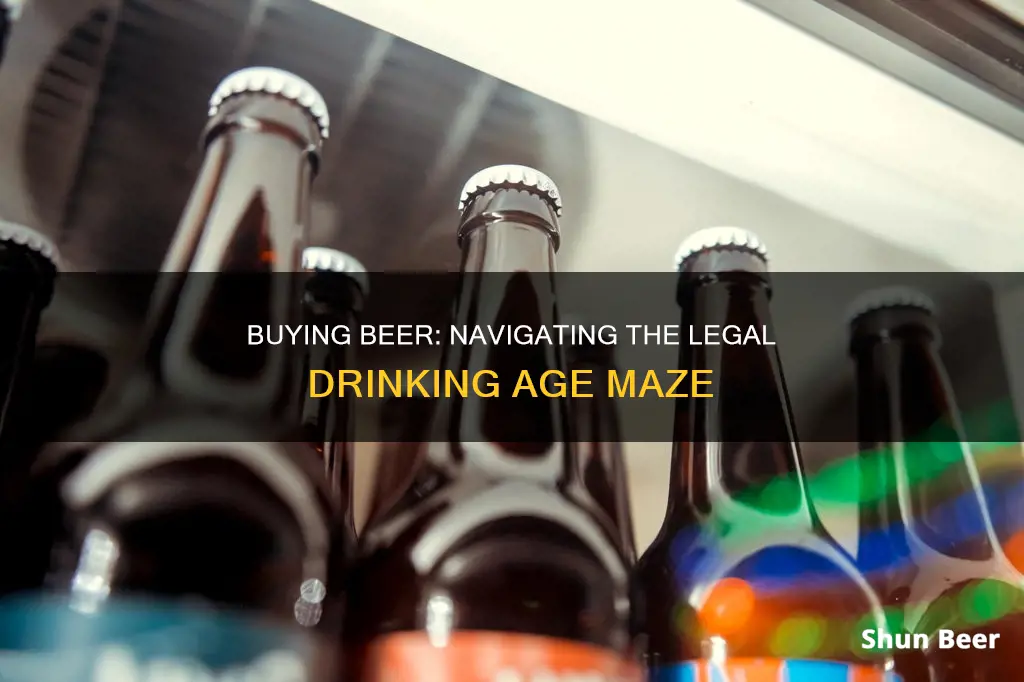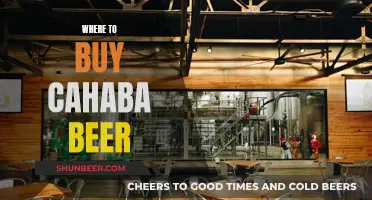
The legality of buying beer depends on where you are in the world. In the United States, the Twenty-first Amendment to the United States Constitution grants each state and territory the power to regulate intoxicating liquors within their jurisdiction, so laws vary significantly across the country.
In general, you need to be over the age of 21 to buy beer in the US, but some states allow those under 21 to drink in certain circumstances, for example, for religious purposes.
In the UK, the legal drinking age is 18, but there are no specific laws about buying beer online. However, you must be over 18 to join a beer subscription club.
| Characteristics | Values |
|---|---|
| Age | Must be 21 or over |
| Time of Day | Varies by state, but generally between 6am and 2am |
| Day of the Week | Varies by state, but some states have more restrictive laws on Sundays |
| Location | Varies by state, but some states have dry counties |
| Type of Alcohol | Varies by state, but some states have different rules for beer, wine and spirits |
| Volume | Varies by state, but some states have a limit on the amount that can be purchased |
| Licence | Varies by state, but some states only allow businesses with a valid liquor licence to sell alcohol |
| ID | A valid ID must be shown to prove age |
What You'll Learn

Age restrictions
The age restrictions for buying beer vary across the United States. In 1984, the National Minimum Drinking Age Act was enacted, requiring all states to set their minimum age to purchase alcoholic beverages to 21 or lose 10% of their allocated federal highway funding. As of 1988, all 50 states had a minimum purchase age of 21, with some exceptions.
Some states allow those under 21 to drink in certain circumstances. For example, some states like Tennessee and Washington permit drinking for religious purposes, while others like Oregon and New York allow drinking on private non-alcohol-selling premises. In Ohio, drinking is permitted for those under 21 in private and public settings, including bars and restaurants, if accompanied by a parent, guardian, or spouse who is 21 or older.
In Texas, minors (any age under 21) are permitted to consume alcohol if in the "visible presence" of a parent, guardian, or adult spouse.
In the United States territories of Puerto Rico and the United States Virgin Islands, the minimum purchasing age is 18 since the Act only applies to states. In the Northern Mariana Islands, Guam, American Samoa, and U.S. Minor Outlying Islands, the minimum purchase age is 21.
State laws can change at any time, so it is essential to refer to the specific laws in your state or local jurisdiction for the most accurate and up-to-date information.
Best Places to Buy PCT Beer
You may want to see also

Time and day restrictions
In the United States, the legal drinking age is 21. However, the sale of alcohol is regulated by each state and territory, and laws vary significantly across the country. These laws include time and day restrictions on the sale of beer and other alcoholic beverages. Here are some examples of time and day restrictions for purchasing beer in different states:
- Alabama: On-premise sales are limited to 2 AM on Sundays. Beer and wine can be sold in supermarkets, but spirits cannot. Many counties in Alabama are "dry counties," where the sale of alcohol is prohibited, although possession and consumption are legal.
- Alaska: On-premise and off-premise sales are allowed from 8 AM to 5 AM any day of the week. Liquor sales are not permitted in grocery stores.
- Arizona: Beer can be purchased between 6 AM and 2 AM every day.
- Arkansas: On-premise sales hours vary by establishment type, with Class A Private Clubs serving from 7 AM to 2 AM, Class B from 10 AM to 5 AM, and restaurants from 7 AM to 1 AM. Off-premise sales are allowed until 1 AM Monday to Friday and until midnight on Saturdays. Beer and wine can be found in supermarkets, but only in-state-produced wine is permitted, and spirits are prohibited.
- California: Beer can be bought from 6 AM to 2 AM daily.
- Colorado: On-premise sales are permitted from 7 AM to 2 AM, and off-premise sales from 8 AM to midnight. Only 3.2% ABV beer is available in grocery stores.
- Connecticut: On-premise sales are allowed from 9 AM to 1 AM Monday to Thursday and 9 AM to 2 AM Friday to Saturday. Off-premise sales are prohibited on Sundays and holidays. Beer is sold in grocery stores.
- Delaware: On-premise sales are permitted from 9 AM to 1 AM, and off-premise sales from 9 AM to 1 AM Monday to Saturday and noon to 8 PM on Sundays.
Buying Beer: Know the Legal Hours in Your State
You may want to see also

Location restrictions
The legality of buying beer depends on where you are located. In the United States, the Twenty-first Amendment to the United States Constitution grants each state and territory the power to regulate intoxicating liquors within their jurisdiction. As such, laws pertaining to the production, sale, distribution, and consumption of alcohol vary significantly across the country.
Alabama
Beer and wine are not controlled by the state, but spirits are. On and off-premise liquor sales are limited to 2 am on Sundays. Beer and wine can be sold in supermarkets, but spirits cannot. There is a 6% ABV cap on beer sales, and bottles cannot exceed 16 ounces. Wine also faces a 14.9% ABV limit. Homebrewing is currently illegal in Alabama.
Alaska
No alcohol is state-controlled in Alaska. On and off-premise sales are allowed from 8 am to 5 am daily. Liquor sales are not permitted in grocery stores.
Arizona
No alcohol is state-controlled in Arizona. Sales are permitted from 6 am to 2 am, seven days a week. Drive-through liquor stores are legal.
Arkansas
On-premise sale is rather complicated and varies between different types of establishments. Off-premise sales are allowed from 7 am to 1 am Monday through Friday but only until midnight on Saturdays. Beer and wine can be sold in supermarkets, but only in-state-produced wine is permitted, and spirits are prohibited. Arkansas has many dry counties, but private clubs are exempt from these restrictions. Sunday and Christmas Day sales are prohibited, with some exceptions.
California
Sales are not controlled by the state. Sales are allowed from 6 am to 2 am daily. Wine, beer, and spirits can be sold in grocery stores. California has lenient laws about liquor promotion, but counties can restrict sales with local laws. The sale of alcohol above 76.5% ABV is illegal.
Texas
Beer can be sold off-premise from 7 am to midnight Monday through Friday, 7 am to 1 am on Saturday, and noon to midnight on Sunday. Hard liquor can be sold from 10 am to 9 pm Monday through Saturday. Beer and wine can be sold in supermarkets. Alcohol above 15.5% ABV requires additional licensing, and on-premise beverages sold on Sunday between 10 am and noon must be accompanied by food.
These are just a few examples of location restrictions regarding the purchase of beer in the United States. It is important to check the specific laws and regulations in your state or territory, as they can vary widely.
Best Places to Buy Dark Hollow Beer
You may want to see also

Alcohol type restrictions
Alcohol laws vary significantly across the world. In some countries, the production, sale, distribution, and consumption of alcohol are banned entirely. In others, alcohol is legal but subject to various restrictions. These restrictions often relate to the type of alcohol that can be sold and consumed.
United States
In the United States, the Twenty-first Amendment grants each state and territory the power to regulate intoxicating liquors within their jurisdiction. As such, laws pertaining to alcohol vary significantly across the country.
Some states have a single set of hours for all types of liquor sales, while others have more complex regulations. For example, in California, alcohol can be purchased on- or off-premises from 6 am to 2 am any day of the year, while in Texas, the hours for alcohol sales differ depending on the day of the week and the type of business.
Additionally, some states have laws that restrict the sale of certain types of alcohol. For example, in Oklahoma, grocery and convenience stores can only sell beer with an alcohol content of up to 3.2%.
Canada
In Canada, alcohol is generally only sold in government-operated or tightly held government-monitored stores. These stores often have restricted hours, and some provinces have additional restrictions on the types of alcohol that can be sold. For example, in Alberta, liquor stores are prohibited from selling "happy hour" promotions and are limited to the number of drinks they can sell per person after 1 am.
United Kingdom
In the United Kingdom, individuals over 18 may produce wine and beer for personal consumption without a license. However, a license is required to produce distilled beverages. Additionally, alcohol packaging must include warning messages about the health effects of excessive consumption.
European Union
The laws in European Union member states vary, but some common themes include high taxes on alcoholic beverages and restrictions on the sale of alcohol in supermarkets and shops. For example, in Norway, beer with an alcohol content of up to 4.7% can be sold in grocery stores, while stronger beverages can only be purchased at government-operated stores.
Muslim-Majority Countries
Many Muslim-majority countries prohibit the production, sale, and consumption of alcoholic beverages entirely or for Muslim citizens. However, there are exceptions, and some countries allow non-Muslims to consume alcohol under certain conditions. For example, in Kuwait, alcohol is forbidden even for non-Muslims and tourists, while in Qatar, alcohol is legal for tourists and expatriates with permits.
Poor People's Beer: Strategies for Affordable Drinking
You may want to see also

Alcohol strength restrictions
In the United States, the National Minimum Drinking Age Act, enacted on July 17, 1984, requires all states to set their minimum age to purchase and possess alcoholic beverages in public to 21 years or lose 10% of their allocated federal highway funding. As of July 1988, all 50 states and the District of Columbia had complied with this Act.
However, the minimum drinking age does not restrict the minimum drinking age or possession of alcohol in private, and most states continue to allow those under 21 to drink in certain circumstances. For example, some states like Tennessee and Washington allow those under 21 to drink for religious purposes. States including Oregon and New York permit drinking on private non-alcohol-selling premises. Ohio allows drinking in private and public settings, including bars and restaurants, if accompanied by a parent, guardian, or spouse who is 21 or older.
In addition to age restrictions, some states have laws governing the strength of alcohol that can be purchased. Alcohol strength is typically indicated as a percentage of alcohol by volume (ABV) and can vary from 3.5% ABV to upwards of 20% ABV for beer. The average strength of beer falls between 4.8% and 5.2% ABV.
- Alabama: No specific ABV restrictions were found, but several counties known as "dry counties" prohibit alcohol sales altogether.
- Alaska: No information on ABV restrictions.
- Arizona: No information on ABV restrictions.
- Arkansas: No information on ABV restrictions.
- California: No information on ABV restrictions.
- Colorado: No information on ABV restrictions.
- Connecticut: No information on ABV restrictions.
- Delaware: No information on ABV restrictions.
- District of Columbia: No information on ABV restrictions.
- Florida: No information on ABV restrictions.
- Georgia: No information on ABV restrictions.
- Hawaii: No information on ABV restrictions.
- Idaho: No information on ABV restrictions.
- Illinois: No information on ABV restrictions.
- Indiana: No information on ABV restrictions.
- Iowa: No information on ABV restrictions.
- Kansas: No information on ABV restrictions.
- Kentucky: No information on ABV restrictions.
- Louisiana: No information on ABV restrictions.
- Maine: No information on ABV restrictions.
- Maryland: No information on ABV restrictions.
- Massachusetts: No information on ABV restrictions.
- Michigan: No information on ABV restrictions.
- Minnesota: No information on ABV restrictions.
- Mississippi: No information on ABV restrictions.
- Missouri: No information on ABV restrictions.
- Montana: No information on ABV restrictions.
- Nebraska: No information on ABV restrictions.
- Nevada: No information on ABV restrictions.
- New Hampshire: No information on ABV restrictions.
- New Jersey: No information on ABV restrictions.
- New Mexico: No information on ABV restrictions.
- New York: No information on ABV restrictions.
- North Carolina: No information on ABV restrictions.
- North Dakota: No information on ABV restrictions.
- Ohio: No information on ABV restrictions.
- Oklahoma: No information on ABV restrictions.
- Oregon: No information on ABV restrictions.
- Pennsylvania: No information on ABV restrictions.
- Rhode Island: No information on ABV restrictions.
- South Carolina: No information on ABV restrictions.
- South Dakota: No information on ABV restrictions.
- Tennessee: No information on ABV restrictions.
- Texas: No information on ABV restrictions.
- Utah: No information on ABV restrictions.
- Vermont: No information on ABV restrictions.
- Virginia: No information on ABV restrictions.
- Washington: No information on ABV restrictions.
- West Virginia: No information on ABV restrictions.
- Wisconsin: No information on ABV restrictions.
- Wyoming: No information on ABV restrictions.
Best Places to Buy Jamaican Ginger Beer
You may want to see also
Frequently asked questions
The legal drinking age is 21.
Online liquor sales are legal in most of the United States but not everywhere. Some state and local laws ban online alcohol deliveries.
It depends on the state and local laws. Some states prohibit the sale of alcohol on Sundays.
It depends on the state and local laws. Some states only allow the sale of alcohol in government-run liquor stores. Others permit the sale of alcohol in grocery stores.
It depends on the state and local laws. Some states and localities prohibit public intoxication and have open container laws that restrict where people can consume alcohol.







